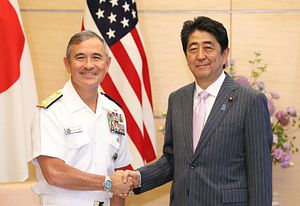In a speech delivered at the Sasakawa Peace Foundation in Tokyo on May 17, the commander of U.S. Pacific Command (PACOM), Admiral Harry Harris, called for deeper trilateral cooperation between the United States, South Korea, and Japan to address North Korea’s recent military actions and provocations.
The U.S. admiral called North Korea, which test fired a new intermediate-range ballistic missile (IRBM) on May 14, “a clear and dangerous threat” to the United States, Japan and to South Korea. “The dangerous behavior by North Korea is not just a threat to the Korean Peninsula, it’s a threat to Japan, it’s a threat to China, it’s a threat to Russia — let me say that again… it’s a threat to Russia — it’s a threat to the United States, it’s a threat to the entire world, “ he added.
Consequently, Harris called for the international community to implement far stronger sanctions against North Korea than are already in place. (Harris’ remarks are in line with a recent White House statement advocating stronger sanctions.)
The admiral was careful not to call for regime change in North Korea when discussing the need for Pyongyang to abandon its nuclear and ballistic missile program. “I firmly believe that the United States, Japan, South Korea, Australia, China, Russia and every nation who considers itself to be a responsible contributor to international security, must publicly and privately work together to bring Kim Jong-Un to his senses, not to his knees.”
Discussing China’s role in helping resolve the ongoing crisis, Harris underlined that in his opinion the Kim Jong-Un regime has become “a liability for China, not an asset.” The admiral emphasized that the United States has been encouraging Beijing to take “appropriate actions” (i.e. tougher sanctions) to force Pyongyang to abandon its nuclear ambitions. He simultaneously tried to reassure the United States’ regional allies.
“While our political leaders and diplomats work to encourage China to use the levers it has to move North Korea towards a better path of peace and stability, PACOM continues to work with our allies and partners throughout the Indo-Asia-Pacific to enhance regional security — it’s in America’s interest to do so, for I believe our nation’s future security and economic prosperity are indelibly linked to this dynamic region.”
He especially underlined the United States’ commitment to defend Japan in the event of a crisis saying that no one should doubt the U.S. resolve to meet its treaty obligations to Japan. “There are more than 50,000 U.S. Soldiers, Sailors, Airmen, and Marines assigned throughout Japan, each contributing to this obligation and to security throughout the region. We are prepared to defend against any aggressor that would threaten Japan’s sovereignty.”
While in Japan, the U.S. admiral also met with Japanese Prime Minister Shinzo Abe, Foreign Minister Fumio Kishida and Defense Minister Tomomi Inada. The Japanese prime minister in his meeting with the U.S. admiral reiterated his respect for the White House’s position that “all options are on the table” in the face of North Korean provocations.

































